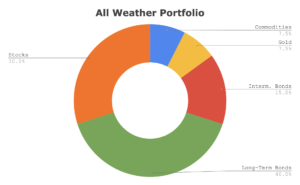It’s scary times for everyone, investors included. As this site focuses on Financial Independence, I’ll try in this blog to direct readers to some useful sources of financial advice.
We’ll start with MoneySense, since in my role as Investing Editor at Large, I’m on top of much of the investing content there.
First, I’d point to Allan Small’s article that appeared over the weekend: The Meaning of market swings and why you should care. Allan recaps current trends in rising inflation and rising interest rates, noting that geopolitical uncertainties can create buying opportunities on certain stocks:
“The key is to make sure your portfolio is diversified. It’s the best — and cheapest — strategy to protect your portfolio in any environment. Balance it with different sectors of the economy.”
Second, Dale Robert’s weekly market wrap for MoneySense always has plenty of good insights into up-to-the-minute market action. His February 27th instalment of Making Sense of the Markets is particularly instructive. Hub readers will be familiar with Dale’s own site, Cutthecrapinvesting, as we regularly republish Dale’s blogs here on the Hub (with his kind permission, of course!).
Here’s Dale’s recent blog on the Ukraine situation. Here’s an excerpt:
“Even a few weeks ago it was easy to predict what would help investors make their portfolios more battle-hardened. Gold and energy certainly rose to the unfortunate occasion.”
Ever since Covid hit, Dale has been furnishing sound investment ideas, often ahead of the rest of the financial blogosphere. For example, he was one of the earliest to sound the alarm that Covid would be a serious problem for investors. He was also early in recommending energy plays like Eric Nuttall’s Nine Point Energy Fund (NNRG) and inflation-fighting recommendations like the Purpose Real Assets ETF (PRA.) That’s one reason why we included Dale as a panelist in MoneySense’s yearly ETF All-Stars feature: the 2022 edition will be out this spring, albeit under the direction of a new writer, Bryan Borzykowski.
No one ever made a dime panicking
How am I responding to the financial aspect of this crisis? Well, as Mad Money’s Jim Cramer often reminds readers in such times, “No one ever made a dime panicking.” Just yesterday, The Successful Investor publisher Patrick McKeough reminded Hub readers that short-term investment decisions all too often sabotage long term returns.
Patrick has been hugely consistent over the years with the following three-fold guidelines, which are as relevant during this Ukraine crisis as in they are in sunnier times:
1.) Invest mainly in well-established, dividend-paying companies;
2.) Spread your money out across most if not all of the five main economic sectors (Manufacturing & Industry; Resources & Commodities; Consumer; Finance; and Utilities);
3.) Downplay or avoid stocks in the broker/media limelight.
In his Inner Circle Advice bulletin issued after Tuesday’s market rout, McKeough titled one section “Putin goes for broke” while urging investors to stay the course if they adhere to the three points above:”In the past third of a century, Russia has gone from dictatorship to fledgling democracy and back to dictatorship. If his Ukraine venture goes awry, it could be the end of the Putin era and the start of a new try at western-style government for Russia.
“Meanwhile, we advise sticking with your portfolio if your investments are in tune with our Successful Investor directives. Now, though, is a good time to re-emphasize that recent IPOs tend to be a poor investment choice, on average. But that’s especially so in a market situation like this one, in which volatility is likely to be above average for some time.”
Some other newsletters to which I subscribe recapped historical market action in advance and during prior outbreaks of war and invasions; generally they found that investors who “bought the invasion” eventually did well.
On the other hand, in an article in the Globe & Mail this Monday, veteran commentator Gordon Pape suggested it wouldn’t hurt to raise cash where you have significant capital gains: while they’re still gains. You can find the article, albeit paywalled, by clicking on this highlighted headline: Investors should take these steps to protect their portfolios from the Russia-Ukraine conflict. Pape also warned, as have many pundits, that if Russia does get away with its Ukraine invasion, it may embolden China to make a similar move on Taiwan.
 Prepare your Portfolio for All Weather scenarios
Prepare your Portfolio for All Weather scenarios
Several of my recent MoneySense columns may be helpful in this environment. Here, for example, is the column I wrote on Ray Dalio’s All-Weather portfolio. As you can see from the pie chart to the right, this is what I mean by Superdiversification and Super Asset Allocation.
Historically, I’ve always respected the classic pension fund and retail balanced fund mix of 60% stocks to 40% bonds. These days, a big chunk of global diversification of stocks and bonds can be implemented through Asset Allocation ETFs like VBAL, XBAL and ZBAL.
However, holding exclusively those funds leaves investors underexposed to some key alternative asset classes that can really help in troubled times such as now. Thus, the All-weather portfolio also includes a 7.5% weight to commodities and another 7.5% to gold and/or precious metals. Here on the Hub, see this prescient blog on the perfect storm for gold.
In his Ukraine blog linked earlier, Dale Roberts also refers to the All-Seasons approach to portfolios:
“You’ll find gold and commodities and long-term U.S. Treasuries offered for consideration in the new balanced portfolio that follows the all-seasons portfolio approach.”
Inflation-linked bonds, Crypto and REITs
Some investors may wish to layer in real estate/REITs and cryptocurrencies, and perhaps Real Return Bonds or TIPS ETFs, which I cover in my current MoneySense Retired Money column: Do Inflation-linked bonds make sense in an era of rising interest rates?
In short, I think they do. Note that Dalio’s All-Weather portfolio has a hefty allocation to fixed income [55% in a mix of long-term and short-term bonds, as well as TIPS], and probably less in stocks [30%, primarily US stocks] than many investors will have. These days, with interest rates seemingly having nowhere to go up but up, what fixed-income exposure one does have should probably be in short-term vehicles or 1-year GICs.
However, despite Tuesday’s significant drop in the major North American indexes, this is by no means a suggestion that investors should sell all their stocks and retreat to cash: at today’s still paltry rates of interest and in an era of surging inflation, parking in cash at this time would be a recipe for a rather lean old age.
To me, I some variant of the All-Weather portfolio will be a classic super diversified portfolio that should let you both sleep well and eat well.
Almost inevitably, some of these asset classes will languish as others surge: but the point is no one can accurately and predict which ones will thrive and which will not in advance.
Finally, I’d be remiss if I didn’t mention the need for Canadians to support Ukraine any way they can. In yesterday’s Financial Post, Diane Francis struck the right note [hopefully not under a paywall]: Ukrainians deserve all the support we can give them.



